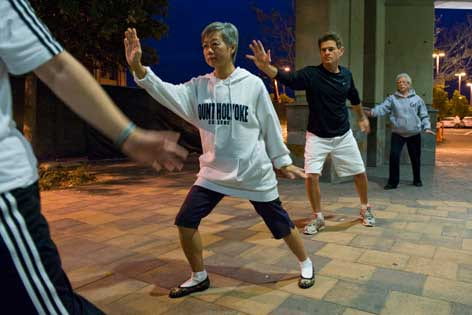A guide to healthy aging
UCI’s Dr. Sonia Sehgal acts as a decade-by-decade guide on the path to healthy aging.

Welcome to 2010. Out with an old decade, in with a new one. In the same way we record time, we mark how we age – decade by decade. Our 20s turn into 30s, and before we know it, we’re in our 40s, 50s and 60s. The clock never stops.
Dr. Sonia Sehgal, associate professor of internal medicine and geriatrics at UC Irvine, is an expert on healthy aging, and she tells her geriatric patients that age is not just a number. It’s a combination of many factors – some we can control, some we can’t.
“Aging is so fluid. What happens to certain people in their 40s might not happen to others until their 60s,” Sehgal says. “So much is dependent on lifestyle and genes.”
Regardless of age, she says, there are steps everyone can take to maximize their health and well-being: quitting smoking, eating better, controlling stress and exercising daily. It’s important to establish positive habits as soon as possible, Sehgal says, “and surround ourselves with happiness and joy.”
Q: People seem to feel pretty invincible in their 20s, but that 30th birthday can hit hard. Are there habits people should be incorporating into their lives early on?
A: It’s hard to predict, but typically, we begin to notice subtle changes in our bodies during our 30s – our skin starts to wrinkle, hair begins to turn gray. At any age, we should cultivate healthy practices that will keep us well for years to come. Eat lots of fruits, vegetables and whole grains. Tailor daily exercise to your individual fitness level. This will help you maintain a healthy weight, because in your 40s, metabolism starts to slow down. Even in middle age, these long-term lifestyle choices will be beneficial. The key is to adopt them as soon as you can.
Q: There’s growing debate over when to begin routine cancer screening – 40s or 50s. What’s your opinion?
A: Medicine today is patient-specific. You need to have a conversation with your doctor and discuss your personal health and family history. Colon cancer screening is a good example. Usually this begins at 50, but if you have a family history of colon disease, you may need a colonoscopy earlier. Your doctor can provide you with the latest recommendations tailored to your unique health and family history.
Q: During the 50s and 60s, people begin facing greater emotional and social challenges along with physical ones – their children are growing up, retirement looms, and many have to care for aging parents. What are the best ways to cope?
A: You have to make taking care of yourself a priority. Too many people put themselves at the bottom of the list. There should be no guilt in making sure your needs are met. Eat well, stay active, see your doctor regularly and rely on your support system – family, friends and co-workers who understand you and support you in positive ways.
Q: In their 70s and 80s, people begin to experience memory loss and an overall decline in physical health and mobility. What can be done to limit this and make these truly golden years?
A: Stay as active as you can, both physically and mentally. Simple steps such as taking walks can go a long way in keeping you healthy. Walking with friends is even more fun. Keeping your mind engaged is also important. Read a book, or do a crossword puzzle. Find something you enjoy and try to do it every day. Don’t stop looking for things that give your life meaning and contribute to the well-being of others.
